Oprah's Most Memorable Guests
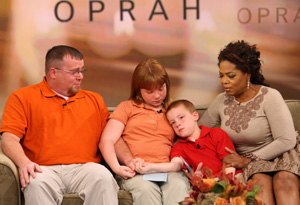
Photo: George Burns/Harpo Studios
In the 25-year history of Oprah Show guests, they're the ordinary people that have made an extraordinary impression on Oprah.
One family Oprah couldn't forget was Jim and his children, Daisy and Kris. In September 2007, 11-year-old Daisy and 7-year-old Kris worked with psychotherapist M. Gary Neuman to talk through their feelings about their family's breakup and mother's subsequent absence. During the emotional hour, Oprah held a crying Kris and Daisy expressed her feelings by reading a letter she had written to her mom.
Look back at their story
During that show, Oprah says Gary taught everyone a key lesson about children and divorce. "Let the children know the truth about what is going on," Oprah says. "Because otherwise they interpret it as their fault or something they did or could have done."
It's a lesson Oprah says has stayed with her ever since. "What I learned from Kris and his sister, Daisy, that day broke me wide open on what it means to be a child of divorce," she says. "Those two brave little souls taught me about the untold damage being done to millions of children going through divorce with their parents."
One family Oprah couldn't forget was Jim and his children, Daisy and Kris. In September 2007, 11-year-old Daisy and 7-year-old Kris worked with psychotherapist M. Gary Neuman to talk through their feelings about their family's breakup and mother's subsequent absence. During the emotional hour, Oprah held a crying Kris and Daisy expressed her feelings by reading a letter she had written to her mom.
Look back at their story
During that show, Oprah says Gary taught everyone a key lesson about children and divorce. "Let the children know the truth about what is going on," Oprah says. "Because otherwise they interpret it as their fault or something they did or could have done."
It's a lesson Oprah says has stayed with her ever since. "What I learned from Kris and his sister, Daisy, that day broke me wide open on what it means to be a child of divorce," she says. "Those two brave little souls taught me about the untold damage being done to millions of children going through divorce with their parents."
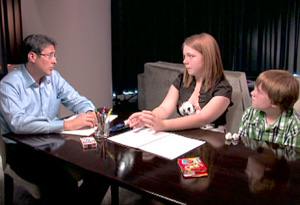
Now 15 and 10, Daisy and Kris return with their dad to share how they're doing. As it turns out, the conversation about divorce doesn't end. It only gets harder.
Four years after their first session, Daisy and Kris meet with Gary again. The children tell Gary they have not seen their mother since before their original appearance. "I thought maybe we could see her again and talk to her," Kris says.
Kris says it isn't easy to see other kids with their mothers. "It just makes me feel like that kid has a great life," he says.
Though Daisy says life is sometimes "unbearable" without a mom around, she's been able to find stand-in moms to help her along the way. "My best friends, I look to their moms as my own," she says. "They're always there for me, and I can trust them."
Gary says that's important for Daisy. "It goes to show you that family is not just about biology," he says. "There are people that can be like your family—whether they're related by blood or not—they can still be such close, wonderful people in your life."
Looking toward the future, Daisy says she's determined not to make her mother's mistakes. "If—when—I have kids, I'm not going to leave them," she says. "Even if we get a divorce, I'm not going to leave them there to suffer. I know how that feels."
No matter what, Kris says he knows he and Daisy will always have their dad. "He'll be there for you no matter what," Gary says.
Four years after their first session, Daisy and Kris meet with Gary again. The children tell Gary they have not seen their mother since before their original appearance. "I thought maybe we could see her again and talk to her," Kris says.
Kris says it isn't easy to see other kids with their mothers. "It just makes me feel like that kid has a great life," he says.
Though Daisy says life is sometimes "unbearable" without a mom around, she's been able to find stand-in moms to help her along the way. "My best friends, I look to their moms as my own," she says. "They're always there for me, and I can trust them."
Gary says that's important for Daisy. "It goes to show you that family is not just about biology," he says. "There are people that can be like your family—whether they're related by blood or not—they can still be such close, wonderful people in your life."
Looking toward the future, Daisy says she's determined not to make her mother's mistakes. "If—when—I have kids, I'm not going to leave them," she says. "Even if we get a divorce, I'm not going to leave them there to suffer. I know how that feels."
No matter what, Kris says he knows he and Daisy will always have their dad. "He'll be there for you no matter what," Gary says.
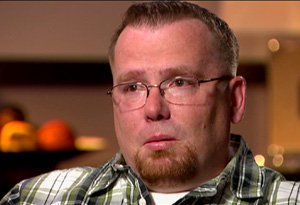
Daisy and Kris' dad, Jim, also meets with Gary. During their session, Jim admits he carries guilt about the divorce. "I've got a feeling there's a lot of stuff built up inside 'em," Jim says. "It bothers me a lot. I would hate to be in their shoes, growing up without a mom."
Jim says he sees the effects of not having a mother on his children, especially Daisy. "It's the things that she's going through, the changes, the answers that I don't have for her," he says.
Gary says Jim doesn't have to always have the right answer. "All you want to do is think, 'How is he or she feeling right now?' And just let them know, 'Wow, it seems like you're kind of sad about this,'" he says. "We can always say to our kid, 'That's a problem. Let's find somebody to talk to about it together. Let's research it.'"
Gary also says Jim—and other parents going through a divorce—don't have to feel guilty. Instead, they should have an ongoing conversation about how they're feeling, no matter how emotional it may get. "When a kid is crying and they're in your arms and you're talking to them, that's not the problem," he says. "It's when they fall asleep every night and consistently crying and you don't know about it, that's the problem. So every year, every two years, every month, whatever it takes to cry, that's okay. Like when we're adults. You have a good cry, what happens? You go on. You feel lighter."
Above all, Gary says children just want to be heard. "If you listen and you hear and love that kid, you are enough," Gary says. "You and every single parent out there—you are enough to set your child up for love for the rest of their lives."
Jim says he sees the effects of not having a mother on his children, especially Daisy. "It's the things that she's going through, the changes, the answers that I don't have for her," he says.
Gary says Jim doesn't have to always have the right answer. "All you want to do is think, 'How is he or she feeling right now?' And just let them know, 'Wow, it seems like you're kind of sad about this,'" he says. "We can always say to our kid, 'That's a problem. Let's find somebody to talk to about it together. Let's research it.'"
Gary also says Jim—and other parents going through a divorce—don't have to feel guilty. Instead, they should have an ongoing conversation about how they're feeling, no matter how emotional it may get. "When a kid is crying and they're in your arms and you're talking to them, that's not the problem," he says. "It's when they fall asleep every night and consistently crying and you don't know about it, that's the problem. So every year, every two years, every month, whatever it takes to cry, that's okay. Like when we're adults. You have a good cry, what happens? You go on. You feel lighter."
Above all, Gary says children just want to be heard. "If you listen and you hear and love that kid, you are enough," Gary says. "You and every single parent out there—you are enough to set your child up for love for the rest of their lives."
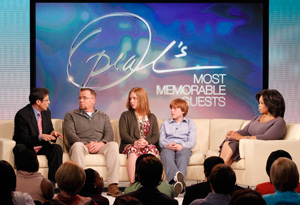
Photo: George Burns/Harpo Studios
Jim says his personal closure will come when he knows Daisy and Kris are no longer hurting. Gary says Jim may be setting his goals too high. "It will affect them for the rest of their lives," Gary says. "But it doesn't have to affect them badly or horribly."
The key for Jim, Daisy and Kris—and other families like them—is caring for one another. "Every one of us, kids and adults, we all have a piece in us that wants to be mothered. We all want to be nurtured," he says. "When we don't get that, we're at risk for growing up and then finding people who are not valuing us, and we're not good to ourselves either. If you're that person, you have to change and care for yourself. Make sure you're finding people who nurture you and make sure you're nurturing yourself."
Looking back at where the family was four years ago, Gary says Jim, Daisy and Kris are in a better place. "Your autobiographies—before, the title would have been Our Crappy Childhood Divorce and Difficulty with Our Mother," he says. "But because you have this man and other people who love you, that title's going to be a chapter, maybe even a footnote. Your title's going to be, We Made It Because We Connected to the Love of Our Wonderful Father."
The one thing every parent should know about divorce
The key for Jim, Daisy and Kris—and other families like them—is caring for one another. "Every one of us, kids and adults, we all have a piece in us that wants to be mothered. We all want to be nurtured," he says. "When we don't get that, we're at risk for growing up and then finding people who are not valuing us, and we're not good to ourselves either. If you're that person, you have to change and care for yourself. Make sure you're finding people who nurture you and make sure you're nurturing yourself."
Looking back at where the family was four years ago, Gary says Jim, Daisy and Kris are in a better place. "Your autobiographies—before, the title would have been Our Crappy Childhood Divorce and Difficulty with Our Mother," he says. "But because you have this man and other people who love you, that title's going to be a chapter, maybe even a footnote. Your title's going to be, We Made It Because We Connected to the Love of Our Wonderful Father."
The one thing every parent should know about divorce
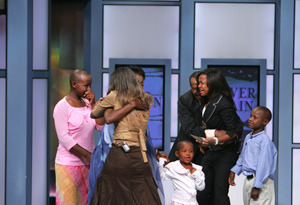
In 1994, Clemantine was a 6-year-old child in Rwanda when she and her 16-year-old sister, Claire, were forced to hide in a banana tree as their family members were murdered in one of the bloodiest genocides in history. In just 100 days, 800,000 people—including members of Clemantine and Claire's family—were massacred with machetes, their bodies dumped into rivers and piled onto roads.
Terrified, alone and convinced their entire family had been killed, the sisters spent six years in refugee camps. Finally, in 2000, they emigrated to the United States and were taken in by foster families.
After years of searching, an acquaintance told Clemantine and Claire that their parents were alive. The family reconnected over the phone, but Clemantine and Claire hadn't seen them in person since the genocide began 12 years earlier.
When Clemantine heard about an essay contest Oprah's Book Club held in conjunction with Elie Wiesel's holocaust memoir, Night, she submitted a winning essay about how his history was a chilling reflection of her own life. She and her sister Claire were invited on Oprah's show.
As the girls stood on Oprah's stage in 2006, Oprah announced that she'd flown their parents to Chicago for a surprise reunion.
Watch the emotional reunion
Oprah says that moment is one of her all-time favorites. "There are a few times over the past 25 years when I can say that I witnessed a miracle on this show. This is one of those times," Oprah says. "I believe that it was one of the single best reunions ever done in the history, not just of this show, but of television. God had a hand in this one."
Terrified, alone and convinced their entire family had been killed, the sisters spent six years in refugee camps. Finally, in 2000, they emigrated to the United States and were taken in by foster families.
After years of searching, an acquaintance told Clemantine and Claire that their parents were alive. The family reconnected over the phone, but Clemantine and Claire hadn't seen them in person since the genocide began 12 years earlier.
When Clemantine heard about an essay contest Oprah's Book Club held in conjunction with Elie Wiesel's holocaust memoir, Night, she submitted a winning essay about how his history was a chilling reflection of her own life. She and her sister Claire were invited on Oprah's show.
As the girls stood on Oprah's stage in 2006, Oprah announced that she'd flown their parents to Chicago for a surprise reunion.
Watch the emotional reunion
Oprah says that moment is one of her all-time favorites. "There are a few times over the past 25 years when I can say that I witnessed a miracle on this show. This is one of those times," Oprah says. "I believe that it was one of the single best reunions ever done in the history, not just of this show, but of television. God had a hand in this one."
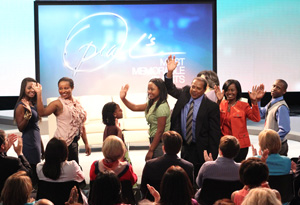
Photo: George Burns/Harpo Studios
Since that show, Clemantine and Claire's entire family have moved to the United States. Clemantine and Claire have also become U.S. citizens. "Claire after the show said, 'I'm going to Rwanda to bring the whole family,'" Clemantine says. "I was like, 'Are you crazy? It's going to be really expensive.' But Claire—every time she says she wants to do something, she definitely does it."
Claire says having her entire family in the United States is a blessing. "Sometimes people ... don't know how much it means to have a family," she says. "It's really nice, and I don't complain anymore."
Claire says having her entire family in the United States is a blessing. "Sometimes people ... don't know how much it means to have a family," she says. "It's really nice, and I don't complain anymore."
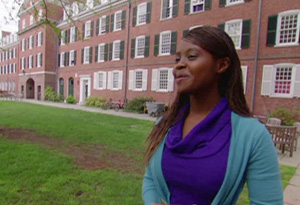
When Clemantine first came to America, she was a refugee who could barely speak English. Today she's a student at Yale University.
See what her life is like on campus
Clemantine says she embraces the challenges she faces at school. "Sometimes it's very hard to have three papers all due the same week where your brain just can't think any further," she says. "But weighing with the other challenges that I've had, it's nothing. I'm not thinking about what food I'm going to eat. I don't have to go fetch water."
When life gets difficult, Clemantine says her pencil case—the only thing she has left from Africa—puts things in perspective. "When I just feel like I can't go to one of those papers, I always look at this little pencil case and say, 'Clemantine, you really wanted to be in school, so shut up and do it,'" she says. "So this little pencil case always reminds me that I have to be quiet, be grateful and do my schoolwork. Think of how far it has come, and I have come a long way."
Clemantine isn't sure what she wants to do after she graduates, but she knows one thing for sure. "I am hoping that I will just work with people who really need help, either in Rwanda or all over in Africa all over in the world, for [people's] stories to be told or [to assist in their] need to be recognized as a human being."
"I have no doubts about you," Oprah says.
See what her life is like on campus
Clemantine says she embraces the challenges she faces at school. "Sometimes it's very hard to have three papers all due the same week where your brain just can't think any further," she says. "But weighing with the other challenges that I've had, it's nothing. I'm not thinking about what food I'm going to eat. I don't have to go fetch water."
When life gets difficult, Clemantine says her pencil case—the only thing she has left from Africa—puts things in perspective. "When I just feel like I can't go to one of those papers, I always look at this little pencil case and say, 'Clemantine, you really wanted to be in school, so shut up and do it,'" she says. "So this little pencil case always reminds me that I have to be quiet, be grateful and do my schoolwork. Think of how far it has come, and I have come a long way."
Clemantine isn't sure what she wants to do after she graduates, but she knows one thing for sure. "I am hoping that I will just work with people who really need help, either in Rwanda or all over in Africa all over in the world, for [people's] stories to be told or [to assist in their] need to be recognized as a human being."
"I have no doubts about you," Oprah says.

Erin Kramp is one of the bravest mothers Oprah says she's ever met. "Her remarkable story created a cataclysmic shift in thinking on how people live their lives," Oprah says. "She taught us to grab the moment, seize it and live in it and don't take anything for granted."
Erin and her husband Doug were happily married, raising their daughter, Peyton, when out of the blue, Erin was diagnosed with breast cancer. Afraid that Peyton would have to grow up without her, she began working on a legacy of love, recording hours and hours of motherly advice for her only daughter. The videotapes covered everything from how to choose makeup ("Try to find makeup that looks natural, like you're not wearing any") to how to choose a husband ("Pick a very nice guy who has a backbone"). In the midst of grueling treatments, Erin also found the strength to write letters and prepare gifts for Peyton to open every Christmas and birthday after she was gone.
Erin also left a special wish for Doug: She hoped he would marry again. In 2005, Doug and 13-year-old Peyton visited Oprah's stage and brought a very special person with them—Peyton's stepmother Cheryl, who was expecting her second baby with Doug.
Erin and her husband Doug were happily married, raising their daughter, Peyton, when out of the blue, Erin was diagnosed with breast cancer. Afraid that Peyton would have to grow up without her, she began working on a legacy of love, recording hours and hours of motherly advice for her only daughter. The videotapes covered everything from how to choose makeup ("Try to find makeup that looks natural, like you're not wearing any") to how to choose a husband ("Pick a very nice guy who has a backbone"). In the midst of grueling treatments, Erin also found the strength to write letters and prepare gifts for Peyton to open every Christmas and birthday after she was gone.
Erin also left a special wish for Doug: She hoped he would marry again. In 2005, Doug and 13-year-old Peyton visited Oprah's stage and brought a very special person with them—Peyton's stepmother Cheryl, who was expecting her second baby with Doug.
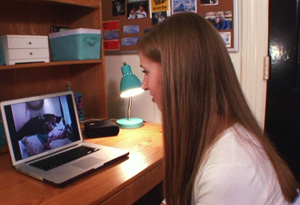
Today, Peyton is a freshman at Duke University and still watches her mother's tapes. "When I was younger, I watched them a lot more. And as I've gotten older, they're a lot harder to watch," she says. "The more I see the tapes, I realize, 'Wow, I had an incredible mom.' And it makes me really sad because I only got to be her daughter for six years. But at the same time, I'm so thankful."
Peyton says her mom's tapes came in handy when she had questions about dating. "I wanted some girl talk. I couldn't necessarily go to [my dad] for," she says. "But she had a lot of good advice about boys and just being a good listener and dressing classy and leaving stuff up to the imagination and playing hard to get. So stuff like that was really helpful."
Erin's legacy is also helping other college students like Peyton reach their potential. After her death, Doug set up the ETK Encouragement Foundation to give scholarships to students who show courage and perseverance against extraordinary obstacles. "One of our recipients, who came over with his family from Mexico and lived under a bridge with his siblings and then made it forward, we got him a scholarship. He is now an assistant dean at [Southern Methodist University]. And now if you get a 3.0 as a scholarship recipient, you get a full ride to SMU," Doug says. "These kids are a living legacy, and they are giving back, and it goes on and on."
See more of Doug and Peyton's lives today
Peyton says her mom's tapes came in handy when she had questions about dating. "I wanted some girl talk. I couldn't necessarily go to [my dad] for," she says. "But she had a lot of good advice about boys and just being a good listener and dressing classy and leaving stuff up to the imagination and playing hard to get. So stuff like that was really helpful."
Erin's legacy is also helping other college students like Peyton reach their potential. After her death, Doug set up the ETK Encouragement Foundation to give scholarships to students who show courage and perseverance against extraordinary obstacles. "One of our recipients, who came over with his family from Mexico and lived under a bridge with his siblings and then made it forward, we got him a scholarship. He is now an assistant dean at [Southern Methodist University]. And now if you get a 3.0 as a scholarship recipient, you get a full ride to SMU," Doug says. "These kids are a living legacy, and they are giving back, and it goes on and on."
See more of Doug and Peyton's lives today

While Peyton's busy studying, Doug and Cheryl are back in Texas raising their young sons, Brian and David. Doug says Erin is still with him. "I feel her at different times in different things, and she's just in my heart, and she'll always be there," he says. "Is there still a hole? Absolutely there's a hole. There will always be a hole. But I just think she was peaceful and confident to the very end."
Listen to Erin's final message
Oprah's greatest lessons
14 overcoming-the-odds stories
Listen to Erin's final message
Oprah's greatest lessons
14 overcoming-the-odds stories



